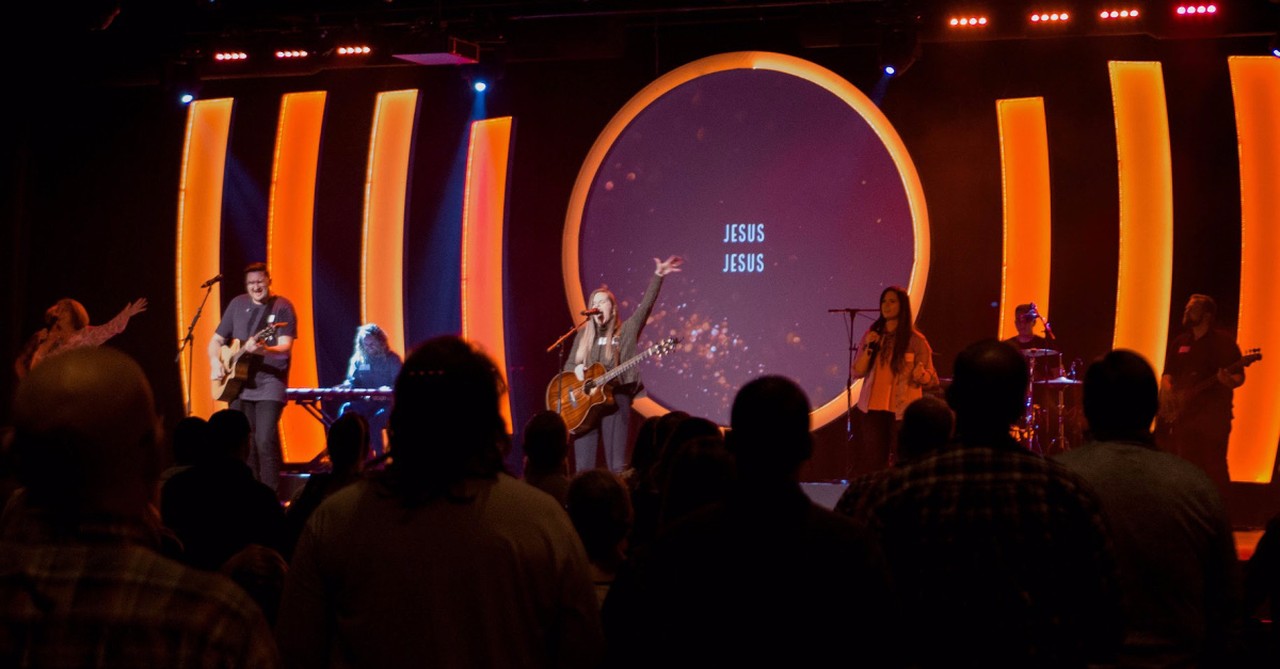
Three Reasons Why the Theology Matters in Worship Songs
The year is 2006 and you’re at a Christian conference enjoying a time of worship. If I were a wagering man, I’d bet that one of the songs in the set will be In Christ Alone by The Getty’s. It’s theological depth and accessible melody made it a staple in not only contemporary worship settings but also those who enjoyed more traditional hymns.
In Christ Alone continues to be popular. Yet, there is a new song by The Getty’s which Trevin Wax believes could rival this popular song. The song is Christus Victor (Amen). Wax says, “I can see this song becoming one of the most influential of their later career. Now that the Sing! Conference version has been released, my assessment stands: This song is among the greatest the church has received in recent years.”[1]
Part of what makes this song so valuable is its “biblically rich lyrics.” Good theology that is highly singable has been the philosophy of the music The Getty’s and those of their ilk have been producing for years. They believe that good theology matters even more than a catchy chorus. This begs the question which I’d like to consider today. Why does theology matter in worship songs? There are at least three reasons.
[1] https://www.thegospelcoalition.org/blogs/trevin-wax/new-getty-song/
Photo Credit: Kalisa Veer/Unsplash
1. Our Affections Should Be Stirred by Biblical Truth

1. Our Affections Should Be Stirred by Biblical Truth
SLIDE 1 OF 4
During the First Great Awakening, there was an influx of new hymns. Many of those which are prized by the church today find their origin in these years. At the time, it was controversial. Many churches restricted their singing to traditional psalm singing. The hymn singing in revival meetings led to much emotional expression. This was one of the critiques of the movement.
Jonathan Edwards, a theological giant, surprisingly argued for the stirring of affections. He said it this way:
I should think myself in the way of my duty, to raise the affections [emotions] of my hearers as high as I possibly can, provided"—then he gave two qualifications—"provided they are affected with nothing but truth, and with affections that are not disagreeable to the nature of what they are affected with."
He further expounded on these thoughts in his work Religious Affections. Emotions which are deeply rooted in biblical truth are valuable to growth in Christ. Edwards contends that true worship isn’t about emotions and feelings for its own sake but rather a heart moved by the reality of God’s Word. Music is powerful. You can be emotionally stirred and moved by music with no words and absolutely no basis in Scripture. Singing stirs the affections.
This is why good theology is important. If the lyrics lack biblical foundation, we risk experiencing a fleeting emotional high rather than an encounter with God anchored in reality. Affections stirred by theology are lasting.
When songs are theologically rich, they allow for emotions to follow the depth and beauty of biblical truth, leading us to respond in ways that honor God. The goal of singing isn’t merely to feel God’s presence in the room but to be centered upon the person of God.
Photo Credit: ©GettyImages/AntonioGuillem
2. Our Songs Shape Our Worldview

2. Our Songs Shape Our Worldview
SLIDE 2 OF 4
Andrew Fletcher, a Scottish writer and politician, once quipped, “Let me write the songs of a nation, and I care not who writes its laws.” It wouldn’t be surprising if Fletcher’s words came from an observation of the Reformation. Luther viewed music as a powerful tool in the hands of a Reformer. He once said: "I have no use for cranks who despise music because it is a gift of God. Music drives away the devil and makes people joyful; they forget thereby all wrath, unchastity, arrogance, and the like. Next, after theology, I give to music the highest place and the greatest honor."
He understood that our songs will always shape our worldview. The Protestant Reformation and other awakenings spread not only through its gospel preaching but also through its gospel singing. Life-changing biblical truths were able to be encased in familiar songs. It’s why many of the early hymns were set to bar tunes. They were memorable and transformative when combined with solid theology.
When I was first doing ministry, I was asked to preach at a nursing home. Most of the people they had wheeled into the tiny chapel area seemed to be far gone mentally. For much of the service, they stared off into the distance with a glassy look in their eyes. (Maybe this prepared me for preaching on Sunday mornings a few years later. I kid, I kid). The years had vanquished their minds, and many of their memories were gone. I don’t think my sermon landed for really any of them.
But when my wife went to the piano and began playing the first few notes of Amazing Grace, it was like standing before a group of teenagers. I was absolutely amazed. It was as if they had partaken of the fountain of youth. They began passionately singing the words of the song. The words of this precious hymn had been so embedded in their psyche that even if they forgot their name, they were able to recall this precious truth.
The same is true for children in our churches today. And our adults. We remember the lyrics. (I can still sing, to my shame, all the lyrics of Ice Ice Baby and a bunch of other rap songs I’d care not to mention). Our worship songs are taught on a Sunday morning. It is embedding truth within the souls of our people. That is why good theology matters. Gordon Fee has rightly said, “Show me a church's songs, and I'll show you their theology.”
When we think about the songs we choose for a worship service, we should think well beyond that Sunday morning experience. We are aiming for so much more. We are aiming for those nursing home moments 50 years from now. We are speaking into the nursery, knowing that we’re implanting truth into children who will someday soon be a teenager pressed into making important decisions. These lyrics will stick—don’t we want it to be good gospel theology?
Photo Credit: © Unsplash/Shaun Frankland
3. Our Music Unifies Us around Core Beliefs

3. Our Music Unifies Us around Core Beliefs
SLIDE 3 OF 4
A.W. Tozer once used the image of a tuning fork to illustrate Christian unity. He remarked that if 100 pianos are tuned to the same tuning fork, they are automatically tuned to each other as well. He said it this way:
“Has it ever occurred to you that one hundred pianos all tuned to the same fork are automatically tuned to each other? They are of one accord by being tuned, not to each other, but to another standard to which each one must individually bow. So one hundred worshipers met together, each one looking away to Christ, are in heart nearer to each other than they could possibly be, were they to become 'unity' conscious and turn their eyes away from God to strive for closer fellowship.”
Music tends to unify us. But unify us around what? We are all singing the same songs. And those songs are shaping our theology and stirring our affections. But is it biblical truth that is doing this? Any community built on something other than the gospel will not last. Our time of worship is a collective affirmation of what we believe about God, salvation, and our identity in Christ. We’re also proclaiming what we believe about one another. What happens if our proclamation through song is grounded in weak theology? Our community will be weak as well.
Songs that are theologically sound provide a sturdy foundation for corporate worship. There is a “one another” aspect to the songs we sing. Colossians 3:16 says, "Let the word of Christ dwell richly among you, in all wisdom teaching and admonishing one another through psalms, hymns, and spiritual songs, singing to God with gratitude in your hearts." The word of Christ is to be that which dwells richly among us. If the lyrics to our songs are not firmly implanted in the gospel of Christ—then what else will be dwelling among us?
We are to encourage one another through song. Do we believe that songs with little substance are going to provide substantial healing? The same is true of the countless number of songs that speak of what we’re going to do for God rather than what God has done for us. Are we proclaiming the gospel and the finished work of Jesus to one another or another list of dos and don’ts? We need these songs for one another—but the depth of their impact is connected to the truth which they proclaim.
Photo Credit: ©iStock/Getty Images Plus/littlehenrabi
Why Theological Depth Makes Worship Songs Last for Generations

Why Theological Depth Makes Worship Songs Last for Generations
SLIDE 4 OF 4
Theologically, depth and accuracy in our songs matter a great deal. It’s not that we have to use big theological terms, but rather that we have rich biblical truths flowing out of highly singable lyrics. That is what made a song like In Christ Alone so rich. And it sounds like it is what will make Christus Victor (Amen) another treasure for the church to use to glorify God and encourage one another.
Photo Credit: Unsplash/John Price

Originally published November 08, 2024.







